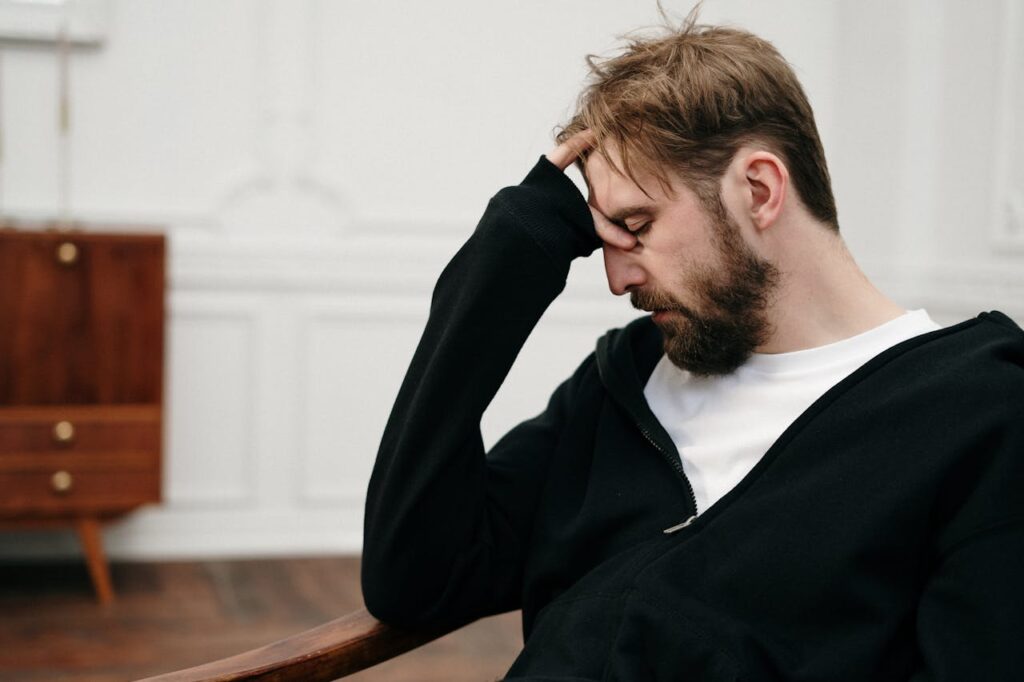
How Low Testosterone Affects Men’s Mental Health and Mood
Do you remember a time when you felt full of energy and life, ready to tackle any challenge that came your way? For many men, there comes a moment when that feeling fades and is replaced with uncertainty. You might not feel like yourself anymore, and this shift can be hard to explain. More often than not, these changes aren’t just about getting older or being overwhelmed by life. They could be a sign that something deeper is off balance—like your hormones.
Hormones influence far more than physical appearance and strength. They impact your mental clarity, emotional stability, temperament, and even your motivation. One of the most influential hormones in men—testosterone—can play a major role in how you think, feel, and function each day. Understanding this connection is key to taking back control of your mental health.
The Overlooked Link Between Hormones and Mental Health
Hormones play a critical yet often underestimated role in shaping our mental and emotional well-being.
Testosterone’s Role in the Brain
Your brain relies on balance to function at its best, and testosterone is an important part of that. It impacts neurotransmitters like dopamine and serotonin—two chemicals that regulate mood, motivation, and happiness. When testosterone levels drop too low, the brain doesn’t get the signals it needs to stay balanced. This can cause sudden mood changes, irritability, and emotional instability.
The Emotional Weight of Low T
Low testosterone isn’t just a number on a lab report—it can weigh on every part of life. Men may start to feel detached, lose interest in hobbies, or become easily frustrated over minor things. It might feel like you’re always on edge or emotionally checked out. These shifts can affect relationships, job performance, and self-confidence. Low T can make it difficult to enjoy life the way you used to.
Why These Symptoms Are Often Misdiagnosed
One of the reasons men struggle for so long before getting help is misdiagnosis. Many symptoms of low testosterone look like depression, anxiety, or chronic stress. Doctors often prescribe antidepressants or anxiety medication without testing hormone levels. Without digging into hormone health, the true cause of emotional struggles may go unrecognized, and men continue to suffer without real improvement.
Common Mental Health Symptoms of Low Testosterone
Recognizing these symptoms early can make a significant difference in managing the effects of low testosterone on mental health.
Mood Swings, Irritability, and Anger
If your emotions feel like they’re all over the place, or if you’re quick to anger without knowing why, it may not be just stress—it could be low T. Hormonal imbalance can cause frequent mood swings and frustration. These feelings are real and not a reflection of your character. They could be your body’s way of alerting you that something biological needs attention.
Anxiety, Depression, and Loss of Motivation
Low testosterone can also take a toll on your overall drive and emotional resilience. You might feel anxious without a clear reason, unusually sad, or find it impossible to get excited about things you normally enjoy. Waking up with no motivation or feeling numb inside is not a weakness—it could be rooted in your hormone health.
Brain Fog and Cognitive Decline
Has your clarity started to fade? Trouble remembering simple things or struggling to focus during conversations could be signs of low testosterone. Brain fog is more than an annoyance. When your thoughts feel slower or more scattered than usual, it may be your hormones sending a message that change is needed.
How Testosterone Therapy Can Improve Emotional Well-Being
Testosterone therapy offers a targeted approach to addressing hormone imbalances that impact mood and emotional health.
Real Changes Patients Report After TRT
Some men experience significant emotional relief after starting testosterone therapy. Increased motivation, better focus, less anxiety, and stronger confidence are common changes. Getting back to a place where life feels manageable—and even enjoyable again—is possible with the right treatment.
Backed by Research and Clinical Studies
There’s growing clinical support connecting testosterone levels to emotional health. Many studies have shown that appropriate hormone treatment can reduce symptoms of depression in men with low T. While no therapy is instant, the consistent reports of mental and emotional improvement are hard to ignore.
The Importance of Personalized Dosing
Testosterone therapy is not one-size-fits-all. Every body is different. That’s why personalized treatment matters. A plan based on your unique needs—not a standard chart—can lead to better outcomes and more consistent improvements. Working with providers who adjust dosing to match your body helps make the process more effective and safer.
When to Consider Getting Your Testosterone Checked
Knowing when to get your testosterone levels checked can be a crucial step toward understanding unexplained changes in your mood, energy, or overall well-being.
Mental and Physical Red Flags to Watch For
If you’re constantly tired, snapping at loved ones, uninterested in sex, or just feel off most days, it might signal a deeper issue. Fatigue, low libido, irritability, and emotional distress are all possible red flags of low testosterone. The signs are easy to dismiss as routine stress or aging, but that can delay your chance to feel better.
What to Expect During Evaluation at RISE Men’s Health
The first step doesn’t have to be hard. At RISE Men’s Health, the evaluation process is easygoing and respectful. It starts with a simple blood test to check your hormone levels. Then you’ll have a conversation where you can share your symptoms openly, and your provider will discuss what options suit your specific situation. There is no judgment, just answers.
Why Early Intervention Matters
Waiting until symptoms become overwhelming can make recovery tougher. Getting your testosterone checked early allows for quicker, more effective treatment. Addressing low T before it starts disrupting multiple parts of your life can put you on a smoother path to mental and emotional recovery.
Breaking the Stigma Around Men’s Mental Health
Changing the conversation around men’s mental health is key to encouraging more men to seek help without fear or shame.
Men Aren’t Broken — They’re Unbalanced
Too many men believe that emotional issues mean they’re weak, lazy, or broken. That’s not true. Mood swings, stress, and sadness could simply point to a chemical imbalance. These issues aren’t flaws—they’re signals. And they’re fixable with the right help and care.
How RISE Men’s Health Supports the Whole Man
RISE Men’s Health takes a full-body approach to care. That means support for your mind, emotions, and health—not just a prescription. The clinic offers judgment-free education, testing, and solutions that actually fit your life. It’s about bringing you back to who you’ve always been.
Your Mental Health Is Worth Fighting For
No man should feel alone in the fight for mental clarity and peace of mind. No one should accept constant fatigue, low motivation, brain fog, or emotional distance as normal. There’s a better way to live, and seeking help is not only strong—it’s necessary.
Reaching out for help can be a pivotal step in reclaiming your balance and improving your outlook. If you’re noticing signs that your mood or motivation aren’t quite where you want them to be, it’s time to take action for your mental wellness. Explore how RISE Men’s Health can provide guidance and solutions tailored to your needs. Secure your path to better health by addressing men’s mental health early, and experience the positive change that comes with comprehensive support.
FAQ Section
Here are some answers to questions you may have about RISE Men’s Health:
Can low testosterone affect your mood?
Yes. Testosterone plays a crucial role in brain function by influencing neurotransmitters like dopamine and serotonin, which regulate mood and motivation. Low testosterone can cause mood swings, irritability, emotional instability, and sudden changes in how you feel.
Can low T cause anxiety and depression?
Yes. Low testosterone can contribute to symptoms such as anxiety, depression, and loss of motivation. Men with low T may feel unusually sad, anxious without clear reason, or emotionally numb. These symptoms can often be mistaken for primary mental health disorders but may actually be hormone-related.
How do I know if low testosterone is affecting my mental health?
Look for common signs such as frequent mood swings, irritability, anger, anxiety, depression, loss of motivation, brain fog, or cognitive decline. If you feel emotionally detached, frustrated easily, or mentally cloudy without an obvious cause, low testosterone might be a factor.
Can testosterone therapy help improve mood?
Yes. Testosterone therapy has helped many men by increasing motivation, improving focus, reducing anxiety, and boosting confidence. Clinical studies support that appropriate hormone treatment can reduce depression symptoms in men with low T. However, personalized dosing is important for the best outcomes.
What are the emotional signs of low testosterone?
Emotional signs include:
- Mood swings and irritability
- Sudden anger or frustration
- Anxiety and feelings of sadness or depression
- Loss of motivation or interest in hobbies
- Emotional detachment or feeling “checked out”
- Brain fog or difficulty concentrating
These symptoms often overlap with mental health issues but can be linked to hormone imbalances.

Jessica is from the Dallas-Fort Worth area. She graduated from Texas Tech University with a Bachelor’s in Psychology and a minor in Nutritional Sciences. She then went on to obtain her Master of Medical Science from Lincoln Memorial University-DCOM. For the past 8 years, she has specialized in men’s health and primary care and is passionate about improving her patient’s quality of life. In her free time, she enjoys spending time with her husband and daughter (and pups!), working out, target practice, hiking, traveling, and DIY home improvement projects.
